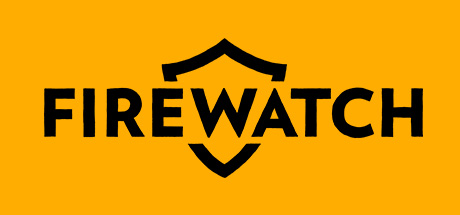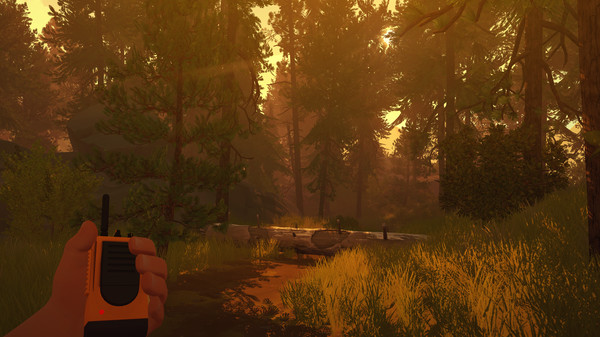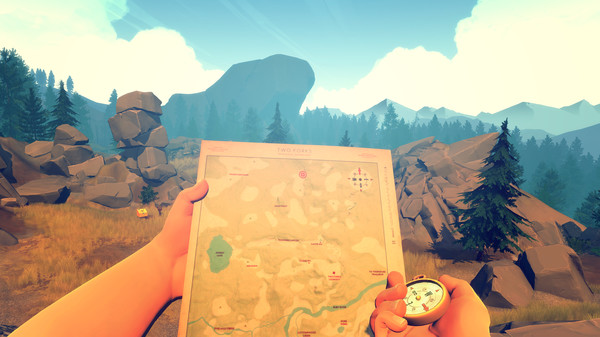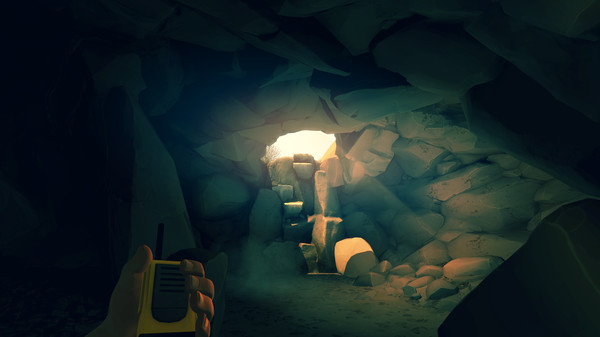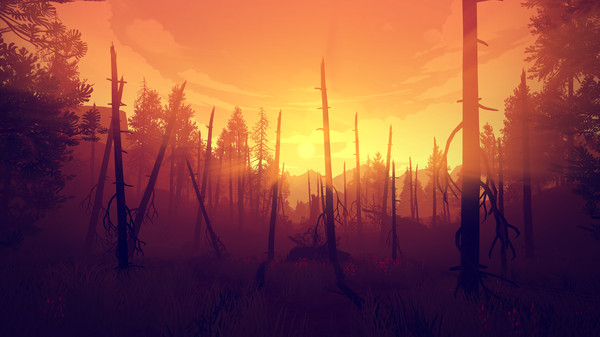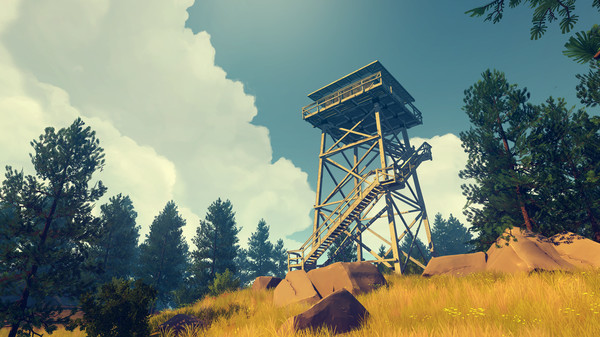Monday, 22 February 2016
REVIEW: 'Firewatch'
I loved reviewing XCOM 2 last week. I've reviewed nothing but either independent or pseudo-independent games throughout the whole of 2016, and you have no idea how satisfying it was returning to a game that had actual gameplay - where you were faced with a scenario and the scenario was completely altered by your choices. It was an organic experience, not a 'walk over here'-em-up.
Not that I automatically hate anything that doesn't feature explosions. For years I've been championing non-violent games that explore precisely what a game is, and delve into the human condition via an interactive medium. In fact, I made one of them Game Of The Year. Journey is the only game I have for the PS4 with an 'E' rating, and that shouldn't be the case. I grew up on gaming, but I fear the next generation will not. I played games where you immersed yourself in a 3D world. I worry children will only play games where you destroy. Minecraft is so popular because it's the only game currently out there that children and adults alike can enjoy. Everything else is desperate pandering to one demographic or the other.
I fear for the future of single-player gaming. Since the Triple A market has realised that making exclusively multi-player games like Star Wars Battlefront (urgh) requires less effort than a single-player game whilst conning players out of even more money, then the independent and pseudo-independent (companies that use crowd-funding and/or are backed by major publishers) market is the only way single-player games will survive at this rate.
So I want to support games like Firewatch...but they just keep sucking.
You know that when you take out all the violence and xenophobia you're supposed to replace it with something else, right? Thief focused on a stealth-based system that allowed the player to immerse themselves in a deep fantasy setting whilst stealing fabulous treasures. Portal let you alter the laws of physics to launch yourself through multiple dimensions. The Stanley Parable de-constructed the very nature of gaming. Papers Please, Her Story, and Emily Is Away used a primitive interface to conceal a larger picture that slowly unravelled itself. Even Kholat had you running away from a monster.
Just shoving a story in there doesn't do anything, because you play a game. A game selling itself as 'story-focused' means 'you do nothing.' It's possible to be character-focused, environment-focused, or atmosphere-focused because this gives you things to interact with. If you want to tell a story then you write a book. If you want to show a story then you make a film or play. You make a game if you want people to live a story.
What story does Firewatch have? Well, you play as Henry (or Hank) whose arms hilariously fist-pump up and down in possibly the worst running animation I've seen. He's just taken a job as a park ranger who's supposed to sit there watching for fires whilst reading books and writing a novel. This sounds like my idea of paradise, and not a very exciting game concept - so obviously things go wrong.
The game starts by spouting some flavour text at you detailing how you meet, fall in love with, marry, argue with, and play around with a wonderful woman. She gets sick. You take a job as a park warden to escape her. All this is told through text. They're clearly trying to subvert the typical 'opening cutscene' formula, yet this text-based approach evokes exactly the same reaction: "Why aren't I playing all this?" It's like if the opening to Up was a Star Wars-like text crawl.
It doesn't help that immediately after this introduction you talk via radio about why you took this job. So why didn't we just start the game at this point? And why is it 1989? Why do games keep setting themselves in the 80's/90's for no reason? There's not even the excuse that if it was set in present day then the characters could just use smartphones. They're in the middle of no-where. Phones wouldn't work and the wardens would have to communicate via radio anyway. Even if there was a signal then wardens still use radio.
The plot itself, despite being the game's selling point, is weak. You start off chasing after these two kids, but then the kids disappear under highly suspicious circumstances and both you and your superior Delilah are like "welp, can't be helped." Later their parents file a missing person report and so what do they do? Completely ignore this, even though the whole situation has alarm bells ringing. Meanwhile the plot begins slowly going through each day but then all of a sudden performs several large time-jumps that completely lose all the atmosphere the game's trying to build. It also has a habit of abruptly ending tense scenes just as they've started to get tense.
The ending in particular rushes to a climax, with the plot devolving into an elaborate and incredibly convoluted grand reveal of what's behind everything. It feels like a twist from a completely different game. In fact, it's a double twist that completely lost me. Plus it turns out that you were in no danger from the start and you've kinda just wasted your time here. It's a deliberate anti-climax, but an anti-climax nonetheless. There's no real closure to anyone's character arc, and it seems sprung from no-where. No-one's learnt or confronted anything, they just have things happen to them which they shrug off.
The dialogue is your typical 'two unlikeable people exchange sarcastic quips.' It's the sort of dialogue that sounds witty until you realise you could swap who was saying each line and nothing would change. Of course these two eventually become close friends and warm up to each-other because that's what always happens, isn't it?
Hank from day one says things that, considering this is his first day on the job, would at best seriously damage his relationship with Delilah and at worse get him fired. Delilah similarly responds in a way that would make me want to quit, or again would damage the relationship. No-one actually talks like this. In reality it takes two people ages before they can start throwing shade at each-other without one of them getting stabbed by the other. This kind of dialogue is fast becoming a cheap way to get us behind characters the instant we meet them, rather than allowing us to warm up to them and be pleasantly surprised. But it fails because I immediately hate both of them, and only roll my eyes when they start falling for each-other despite both acting so horrid.
Even more annoying than the characters you're stuck with is how you can't do anything without reporting it on the radio first. You're asked to find a cache, but you can't just open it and take what's inside before carrying on, you have to report it first; leading to an embarrassing exchange where you have to say "found it" and Delilah says "great" in a mocking tone that makes me want to toss the radio off a cliff.
I would say this is the game's attempt to make Henry seem like he needs to be pushed, or needs confirmation before doing anything. Yet this just doesn't flow into the gameplay. The only time it works is when you're just having idle conversation with Delilah, which to be fair gets better once she goes through the inevitable 'softening up' phase and actually starts sounding like a human...though I still don't like these people. I felt like I was missing out on content because I didn't want to report anything non-essential lest I be treated to another parade of faux wit.
The gameplay itself is very much a walk-em-up. I like how there's no objective markers, yet your map tells you where you are. It treads the line between assuming you know how to read and also assuming you're not a professional mountaineer. This though is the only part that feels organic. Everything else is controlled entirely through button-prompts as you report things and...that's it. Sometimes you have to press a button prompt to do a thing, but it's all just a case of walking around and pushing a button when it says so. Except pressing the button only ever results in more talking to listen to with clenched fists. That, or you press a button and watch Hank climb some rocks. Because, like Kholat, you're in mountains but you don't actually do any mountaineering. Why are games these days so opposed to jump buttons?
There's a promise of actual gameplay early on when it's revealed that there are grizzly bears in the park. I immediately perked up, and not just because there was a possibility that these characters will all die horribly. The way the grizzly bears are teased sounds like the set-up to a horror movie, and pleasantly reminded me of all the horror stories you hear about national parks. But this is teased in broad daylight by Delilah being as sarcastic as ever.
The majority of the game takes place in broad daylight with nothing but the wind and birds to keep you company. It's a nice atmosphere, but knowing there's nothing out there completely removes any investment I might have had. Skyrim had plenty of walking too, but just one commute would result in endless possibilities. Someone might attack, I might run into a skirmish, I might meet another traveller, find an inn or cave, sometimes quests are started by bumping into someone on the road, there might be some kind of tomb or obelisk, there are countless catches of loot, or a dragon might show up.
Later weird things start happening but, again, it's almost all in daylight. There's just no sense of urgency in the action, even when there's clearly supposed to be. I just didn't feel tense because I always felt reassured that nothing was going to happen. The game is so scripted and non-organic in it's nature that I knew I wouldn't be harmed unless that was part of the story. There's also plenty of backtracking, which just adds to the monotony. Oh, and there are invisible walls. So when this game says it's 'exploration-focused' it's lying.
The tone of the game is all over the place. It tries to be witty with it's infuriating dialogue, yet it's also trying to be a thriller, a horror, a hiking simulator, all whilst being a melancholic journey of a man confronting responsibility whilst trying to escape it. It jumps back and forth between trying desperately to frighten you, trying to make you laugh, and trying to make you feel empathy.
The PC version has controller support...sort of. This is one of those games that are littered with button prompts, and none of the button prompts are for the controller. So whenever a 'press X to Y' prompt comes up as you wave your cross-hair over anything that isn't a tree, it's a fumble to work out which button's the right one. Fortunately you are under no time pressure whatsoever throughout the game, which just makes me wonder why I'm playing this if I'm not being challenged, not being emotionally moved, and not having fun.
To top everything off, this game is only about three hours long, which would be fine except it costs £15. Not only does it pad out the runtime with needless backtracking, but there's no replay value. The story doesn't change depending on your actions, there aren't any hidden areas or collectibles, it's not worth seeing what 'hilarious' dialogue exchanges you missed out on, and once you know that you were never in any danger to begin with then the whole thing's ruined. This is the sort of game you'd only play again if you just enjoyed it so much that you want to experience it once more. Except you won't. Between this, Gone Home, Kholat, That Dragon Cancer, and The Witness; I never want to play a non-violent, pseudo-independent, 'story-focused,' first person game again. This is the last straw. No more.
Labels:
2010,
first person,
indie,
PC,
review

